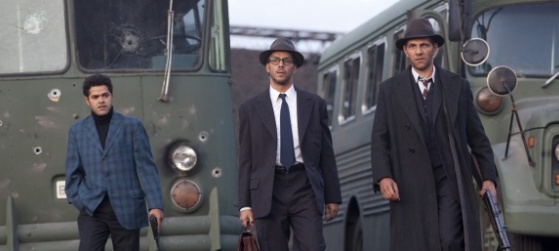Showing @ Filmhouse, Edinburgh, Fri 6 – Thu 19 May
As the uprisings in the Arab world continue to escalate, our ignorance of individual plights and suffering have only mystified our perceptions further. Director Rachid Bouchareb picks up after his previous film Days of Glory which so boldly recounted the struggle of colonial North Africans during their liberation of Nazi-occupied France. Now however, he skips forward to the 1950s to foreground the radical members of the underground National Liberation Front network and their attempts to free Algeria from French colonisation. Fought on Parisian soil, it predominantly follows Abdelkader (Sami Bouajila), an idealistic intellectual whose leadership rouses and inflames the nationalist passions of his countrymen.
Bouchareb employs the same quick-fire, chopped up narrative style as he used in Days of Glory, which, while being important in speeding along the historical details of the revolution, creates a variably inaccessible storyline. Though once the film irons out its flaws, Bouchareb’s ability to capture a sense of desolate beauty comes into focus; from the ashen districts of ramshackle Algeria to the impoverished shantytowns of segregated France, his mapping of an ideological tussle against the backdrop of social destitution both distresses and seduces. While at times shading the stereotypical with scenes of stylised, Hollywood-esque action, it’s perhaps the film’s attention to detail; the barren landscapes, the intricacies of party manipulation, which earned its Academy Award nomination for Best Foreign Language Film this year.
And whilst there is a need for both realism and dramatisation, Bouchareb explores more than just the conflict itself; he suggests that the problem with idealism is that it veils the surrounding frailties of human life, and in many ways, can enslave in the same way oppression and colonisation do. And he really holds on to this examination, building a sense of both internalised and externalised pressure, from the ideological sparring between the brothers to the oppressive French authorities. Though the film drifts from its in-depth analysis with a trigger-happy attitude towards the war’s portrayal, it manages to uphold its polemic with scenes of systematic execution – for instance the contentious playing out of the Sétif massacre. And with the timing of this film’s release coinciding with the revolutions occurring in Algeria itself, as well as neighbouring Libya, Morocco and other nations, it’s perhaps the most relevant and germane film we will see for some time.
